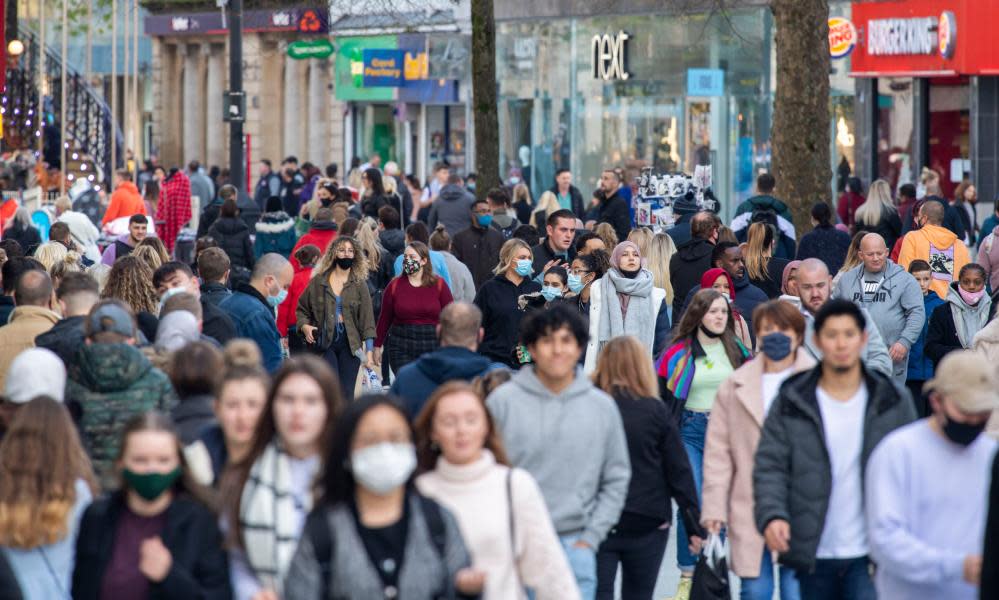More than 2m adults in England have had long Covid for over 12 weeks – study

More than 2 million adults in England have experienced coronavirus symptoms lasting over 12 weeks, government data suggests – double the previous estimate for long Covid.
The study, one of the largest to date, found that people with ongoing symptoms tended to fall into two categories: those with respiratory symptoms, who often experienced more severe illness when they first got sick, and a second group with fatigue-related symptoms.
Like previous studies, it found that women were more commonly affected and that the prevalence of ongoing symptoms increased with age. Researchers described the findings as “alarming”.
The React-2 study is a government-funded population surveillance study that uses finger-prick antibody tests from randomly selected adults in England to assess how far coronavirus has spread. Between September and February, 508,707 participants were also asked whether they thought they had had Covid and about the presence and duration of 29 different symptoms.
The research, which has not yet been peer-reviewed, found that 37.7% of those who had symptomatic Covid experienced at least one symptom lasting 12 weeks or more – equivalent to 2 million people – while 14.8% experienced three or more persistent symptoms.
“The scale of the problem is quite alarming,” said Prof Kevin McConway, emeritus professor of applied statistics at the Open University. “The results can’t tell us clearly how serious those symptoms were in terms of their effects on the patients’ lives. Some may not be very serious, but some of them certainly are, and these results clearly point out how vital it is to understand them properly and to provide adequate treatment and support services for the people involved.”
In May the Office National Statistics (ONS) estimated that 1 million people in the UK were experiencing self-reported long Covid. A key difference is that React-2 did not ask if people had long Covid, only about ongoing symptoms. “Many people may not consider they’ve got long Covid, they just have a persistent slight shortness of breath, or their loss of sense of taste has persisted for many, many months,” said Helen Ward, professor of public health at Imperial College London, who co-led the study.
Related: Some long Covid sufferers in England waiting months for treatment
McConway said the ONS research estimated the number of people who had symptoms lasting at least 12 weeks on a particular date (2 May), while React-2 measured how many have ever had long Covid between September and February.
Meanwhile, a separate study of 312 Norwegian patients published in Nature Medicine on Wednesday found that 61% were still experiencing persistent symptoms at six months – including 52% of 16-30-year-olds. The most common symptoms they reported were loss of taste and/or smell and tiredness.
McConway said: “The lack of clarity on exactly how many people are affected shouldn’t draw attention away from the fact that the lowest estimates still show a huge amount of largely unmet need.”
The React-2 study also found that the prevalence of persistent symptoms increased with age, with a 3.5% increase in the likelihood of developing long Covid for each decade of life. Women were 1.5 times more likely to experience ongoing symptoms than men, and people who were overweight, smoked, lived in deprived areas or had been admitted to hospital were also at greater risk. However, persistent symptoms were less common among Asian ethnic groups.
It also suggested that certain symptoms often cluster together. “About a third of people had what you might think of as more physiological symptoms, like shortness of breath, tightness in the chest, chest pain, and the others had a more post-viral type of syndrome dominated by tiredness,” said study co-leader Prof Paul Elliott, chair in epidemiology and public health medicine at Imperial College. “And it so happens that the people who reported more severe illness at the beginning, there were more of them in the respiratory-type cluster than in the post-viral tiredness-type cluster.”
Matt Hancock, the health secretary, said: “Long Covid can have a lasting and debilitating impact on the lives of those affected. Studies like this help us to rapidly build our understanding of the impact of the condition and we are using these findings and other new research to develop support and treatments.”

 Yahoo Movies
Yahoo Movies 
